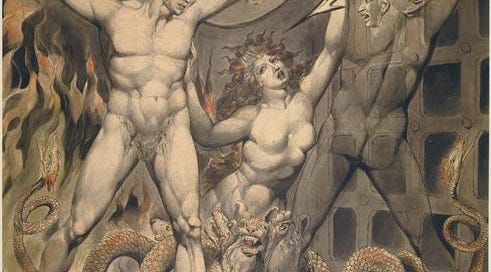‘The question of capitalism—precisely because the system itself is once again posing (agonizing over) the question, and therefore its true enormity emerges from behind the shadow play of parties—has to be bracketed. It cannot be made political. The left should turn its attention to what can.’ - T.J. Clark, ‘For a Left with No Future’
In 2012, T.J. Clark, former Situationist turned world-famous modern art historian, wrote ‘For a Left with No Future’. Published in the New Left Review, it was a provocative statement, issued at time when the experience of the 2008 Crash had seemingly revived socialistic radicalism in such forms as ‘Occupy', militant environmentalism and Left populism. ‘For A Left With No Future’ argues that any ‘reconstruction of the project of the Enlightenment’ for today requires a ‘deeper’ look at the history of the Left, and for that, ‘[t]he book we need to be reading—in preference to The Coming Insurrection, I feel—is Christopher Hill’s The Experience of Defeat.’
The Coming Insurrection, published by the French ‘Invisible Committee’ in 2009, argues that traditional forms of organising - in parties, united-fronts, single-issue campaigns, etc - had become ineffective given the ‘imminent collapse of capitalist culture’. With reification now enveloping the entire social totality, a more urgent and realistic response was called for. The Coming Insurrection advocates a network of communized affinity groups: autonomous, decentralised, and with no structure that could be legally defined as a party or any kind of organisation that the government could ban or prosecute. This was especially important as the immediate three-headed enemy - state, capital and the police - had to be confronted with effective direct action. Such ideas as these could obviously inspire - directly or indirectly - the sabotages of infrastructure projects in France (rail, cement, water, etc) that persist to this day, despite the state’s efforts to suppress them. More ‘positively’, the Invisibles point out that in various areas of the world hit by man-made eco or economic disaster people have organised themselves, breaking from the breakdown of social order to self-organise.

The Invisibles are clear that the ultimate goal is anti-capitalist revolution. But for T.J. Clark, in ‘For A Left With No Future’, the idea of a socialist/revolutionary transformation is essentially utopian. The trouble with utopianism is that it is a subjective abstract idea which seeks to impose itself on an objective reality as its ‘truth’. But in truth, the reality consists of subjects with their own ideas on how society should be run, i.e. how to reconcile universal and particular in a community united with nature. Quoting from Christopher Hill’s book on the English Revolution, The Experience of Defeat, Clark refers to a letter from the millenarian Moses Wall to John Milton, written in 1659 during the last days of the Cromwellian Protectorate. Wall complains of the betrayal of the ‘poor people’ under the rule of Cromwell’s generals:
'[W]hilst people are not free but straitened in accommodations for life, their Spirits will be dejected and servile: and conducing to [reverse this], there should be an improving of our native commodities, as our Manufactures, our Fishery, our Fens, Forests, and Commons, and our Trade at Sea, &c. which would give the body of the nation a comfortable Subsistence.'
Clark sees Wall’s ‘most modest, most moderate of materialisms’ as forming the basis of what is ‘still a maximalist programme’. Moses Wall’s ‘materialism’ advocated changing material reality to bring about a ‘comfortable subsistence’. I suggested at the time, in a review, that the book we needed to be reading as well as Hill’s was Steven Pincus’s 1688: The First Modern Revolution. According to Pincus:
'Modern revolutions are not struggles to overturn traditional states. They occur only after regimes have determined, for whatever reason, to initiate ambitious modernization programs. Revolutions, then, pit different modernizers against one other.'
Isn’t that - for better or worse - what is going on now? T.J. Clark says, ‘If I can't have the proletariat as my chosen people any longer, at least capitalism remains my Satan.’ Well said, but as Milton has Satan say in Paradise Lost:
‘To union, and firm Faith, and firm accord,
More than can be in Heav'n, we now return
To claim our just inheritance of old,
Surer to prosper than prosperity
Could have assur'd us; and by what best way,
Whether of open Warr or covert guile,
We now debate; who can advise, may speak'
REFERENCES FOR RECENT ARTICLES
Ann Balakian, Surrealism: The Road to the Absolute (Chicago University Press: 1987).
Walter Benjamin, Charles Baudelaire (London: Verso 1976), 176.
Walter Benjamin, Illuminations (London: Fontana 1970 ]
www.marxists.org/reference/subject/philosophy/works/ge/benjamin.htm
Walter Benjamin, The Origin of German Tragic Drama. Translated by John Osborne (2003)
David Black, From Habakkuk to Locke: The non-peculiarity of the English Glorious Revolution
(Book Review: Steve Pincus, 1688: The First Modern Revolution (New Haven: Yale University Press, 2009). Platypus Review #49, September 2012.
André Breton , What is Surrealism? Selected Writings. Ed. Franklin Rosemount, (London: Pluto 1978);
Situationist International Anthology, Ed. Ken Knabb (Berkeley: 1981)
Guy Debord, Society of the Spectacle
Technical Notes', in Guy Debord’s Complete Cinematic Works (San Francisco: 2003) [http://www.bopsecrets.org/SI/debord.films/howls.htm]
GWF Hegel, Werke Vol 13. 141-2, in Jason Gaiger, ‘Art as Made and Sensuous: Hegel, Danto and the “End of Art”’, Bulletin of the Hegel Society 2000.
“Selections from Hegel’s Lectures on Aesthetics,” eds. Bernard Bosanquet and W.M. Bryant, The Journal of Speculative Philosophy, (London:1886). [http://www.marxists.org/reference/archive/hegel/index.htm]
J Gaiger, in “Art as Made and Sensuous,” Bulletin of the Hegel Society 2000.
Jean-Michel Mension, The Tribe (London: Verso 2002).
Gillian Rose, Judaism and Modernity:Philosophical Essays (Verso: 1993, 2017)
Gillian Rose, Marxist Modernism; Introductory Lectures on Frankfurt Schoo Critical Theory, (2024)
Vincent Kaufman, Guy Debord: Revolution in the Service of Poetry (University of Minnesota Press:2006). On the history of Letterism see also Len Bracken, Guy Debord – Revolutionary (Venice CAL: 1997)
Articles
T.J. Clark, Reservations of the Marvellous. Review of The Arcades Project by Walter Benjamin, translated by Howard Eiland. Harvard, 1999. London Review of Books, Vol. 22 No. 12 · 22 June 2000
Bainard Cowan, 'Walter Benjamin's Theory of Allegory', New German Critique, Winter, 1981, No. 22.
Joel Lande, 'German Trauerspiel and Its International Nexus: On the Migration of Poetic Forms' in Politics and Aesthetics in European Baroque and Classicist Tragedy,
Charles Rosen, 'The Ruins of Walter Benjamin', New York Review of Books, 27 October 1977.




